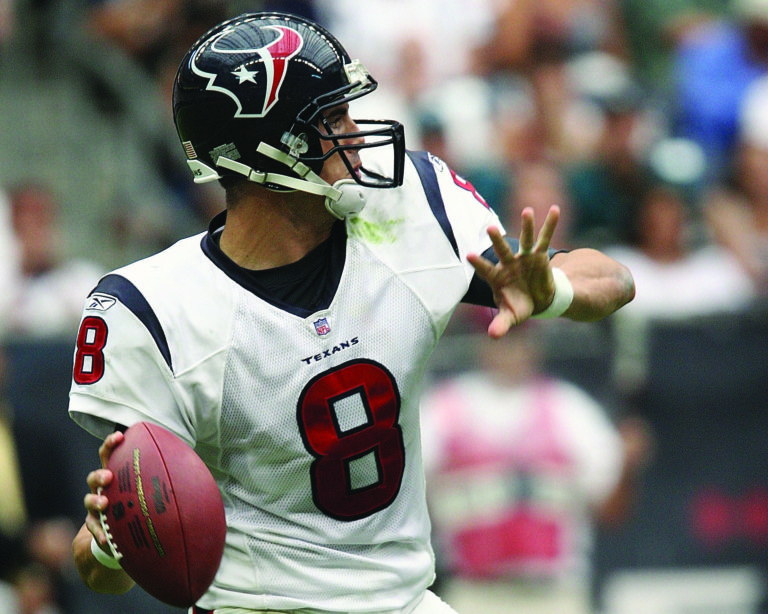By Ty Schadt, Sports Editor
Fantasy football is a popular game mode that calls upon one’s pigskin passion and prowess for drafting imaginary teams and managing faux lineups. NFL players gain fantasy points based on their real-life performances, enabling fantasy owners to compete head-to-head against other members of their league with the intention of winning weekly matchups. Its fun-spirited and interactive nature has brought great attention and profit to the NFL and its players.
However, many NFL players have rebuked the game mode, claiming it causes fans to view them in an impersonal manner. It seems as though, in their eyes, instead of bleachers or televisions distancing fantasy players from athletes, the divide is deeper and takes the form of a slave-master relationship. This perception is extreme, but not entirely wrong. If the byproduct of fantasy wins is the belittlement of real life athletes, is it even worth it to play? To them, the very thing that’s breathing life into the league is the same thing that devalues the actual players of the real-life game.
According to a 2016 survey conducted by the Fantasy Sports Trade Association, 54 percent of consumers would cancel a league-supported media service if not for fantasy sports. On top of that, 64 percent of the general population said they watch more live sports because of fantasy sports. This is one good part of fantasy football: its symbiotic relationship with the NFL.
Given the fact that these network partnerships are a large part of what pays players’ salary, one would think they’d be more gracious to the fantasy community. After all, the people who draft them on their fantasy teams are the same folks tuning in to watch them play every week.
However, that’s not always the case. A month ago, the Seattle Times reported that the Seahawks cornerback Richard Sherman said, “I think a lot of people, a lot of fans out there have looked at players less like people because of fantasy football and things like that.”
Why does the star defensive back feel this way? He claims fantasy dehumanizes players. Instead of valuing a real player as a person, Sherman believes fantasy owners only care about the player as a means for fantasy success. He thinks fantasy players view professional athletes as ants, bringing back crumbs to the colony week in and week out. Over and over they go, but if for some reason they don’t bring their share of crumbs one day, that’s okay – another indistinguishable ant can surely be sent out next time instead.
I can’t say this behavior isn’t typical of fantasy owners. After all, we want our teams to perform well. We grow impatient when a player doesn’t perform up to our expectations; so, what do we do? Much like an actual NFL team would, we cut and paste another figure into the equation and hope to solve the problem next time.
So I ask, is there really anything wrong here? Fantasy football is a make-believe, harmless form of entertainment that follows the NFL-esque “rotate and replace as needed” business model. Being such, is it worth players getting upset over?
In all reality, I think fantasy sports make people care more about the NFL and its players. If it weren’t for fantasy, I wouldn’t know nearly as many players or watch as many games as I do. It takes research and investment to build a successful team. By putting in this type of effort, I grow to care about the league and enjoy it to a deeper extent.
There’s another level to Sherman’s argument, though. In the game prior to his comments, Seahawks running back Chris Carter suffered a horrific leg injury. Sherman took the chance to call out fantasy players for a repulsive tendency we exhibit when he said, “This is real life and this is their real job that is affecting their well-being. Now your fantasy team may not win and hey, guess what? You’ll live the next day. This is their well-being. They may not ever get another shot. They may never get another down, another play.”
It’s true, fantasy football can cause fans to become insensitive to this topic. It’s inhumane for fantasy players to cheer when an opponent’s star running back breaks his ankle, or to become upset when their quarterback decides to rest an extra week to recover from a concussion. Yet this is the ugly head that fantasy players rear nearly every week. No amount of competitiveness ever makes it okay to rejoice over an injury.
Do I think this is reason enough for an NFL player to denounce fantasy football? I suppose. But I also think it’s worth them recognizing the fact that fantasy football is a major factor in promoting their likeness and paying their salaries, and should therefore be appreciated as such.
The NFL and fantasy football have been scratching each other’s backs for many years, and it’s time for players to jump on board and be content with having their backs scratched too.
Photo courtesy of Foter




